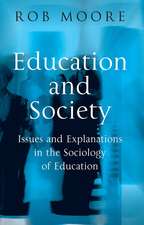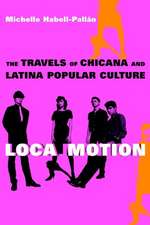Sociology of Knowledge and Education: Continuum Studies in Research in Education
Autor Rob Mooreen Limba Engleză Hardback – 11 apr 2007
Preț: 889.71 lei
Preț vechi: 1034.54 lei
-14% Nou
Puncte Express: 1335
Preț estimativ în valută:
170.29€ • 177.11$ • 142.70£
170.29€ • 177.11$ • 142.70£
Carte tipărită la comandă
Livrare economică 14-28 martie
Preluare comenzi: 021 569.72.76
Specificații
ISBN-13: 9780826496508
ISBN-10: 0826496504
Pagini: 212
Ilustrații: Illustrations
Dimensiuni: 156 x 234 x 22 mm
Greutate: 0.47 kg
Editura: Bloomsbury Publishing
Colecția Continuum
Seria Continuum Studies in Research in Education
Locul publicării:London, United Kingdom
ISBN-10: 0826496504
Pagini: 212
Ilustrații: Illustrations
Dimensiuni: 156 x 234 x 22 mm
Greutate: 0.47 kg
Editura: Bloomsbury Publishing
Colecția Continuum
Seria Continuum Studies in Research in Education
Locul publicării:London, United Kingdom
Caracteristici
This is a provocative and challenging text that engages with a wide range of issues in original ways and will undoubtedly stimulate debate among educationalists.
Cuprins
INTRODUCTION. SECTION ONE: THE PROBLEM OF KNOWLEDGE. CHAPTER 1. For Knowledge: tradition, progressivism and progress in education - reconstructing the curriculum debate. CHAPTER 2. Going Critical: the problems of problematising knowledge in education studies. CHAPTER 3. The Way We Live Now. CHAPTER 4. Cultural Capital: objective probability and the cultural arbitrary. CHAPTER 5. Hierarchical Knowledge Structure and the Canon: a preference for judgments. CHAPTER 6. Basil Bernstein and Social Theory. CHAPTER 7. Knowledge Structures and Intellectual Fields: Basil Bernstein and the Sociology of Knowledge. SECTION TWO: THE REGULATION OF KNOWLEDGE. The chapters in this section are concerned primarily with the way in which views of the economy have been constructed in various ways that have had significant implications for the regulation and control of education. There are three main areas of the consideration. The first is with the sociology of education itself and the ways in which different approaches (Marxist, technical-functionalist, etc) have theorised the relationship between the education system and production. The second is with the ways in which accounts of economic change have been constructed in education policy in order to legitimate changes in education - especially to attack liberal-humanist and progressive education and advance competency based forms of vocationalism in order to regulated professional practice. The third has to do with the ways in which the incorporation of 'the world of work' into the school curriculum, in differing ways, regulates the relationship between official school knowledge and the everyday knowledge of pupils based in class-cultural practices and experience. The relationships between traditionalism, progressivism and varieties of vocationalism are a linking thread. CHAPTER 8. Education, Production and Reform. CHAPTER 9. The Construction of Skill. CHAPTER 10. The Case of TVEI (Technical and Vocational Initiative). CHAPTER 11. Appropriating Competence:the competency movement, the New Right and the 'culture change' project. CHAPTER 12. Professionalism, Expertise and Control in Teacher Training.CHAPTER 13. Education and Post-Fordism.CHAPTER 14. The Correspondence Principle and the Marxist Sociology of Education.CONCLUSION. Back to the Future: the problem of change and the possibilities of advance in the sociology of education.


























